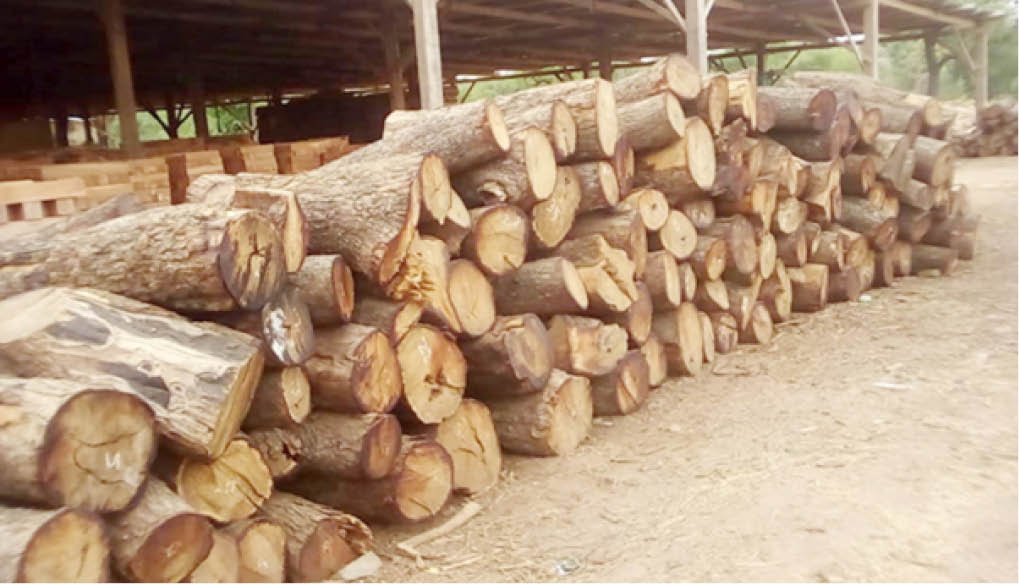Today, a lot of concern is being raised about the conservation of rosewood in Africa. The African rosewoods are among the most endangered plant species in West Africa due to the unique traits and increasing national and international demand for high quality timber, smugglers and local communities’ exploit and export of this valuable resource.
Some years back, rosewood was not a commodity on the African local timber market but just used for firewood and production of charcoal, until the high demand from China led to illegal logging across the continent thereby increasing its exploitation and export.
According to the African Union (AU) reports, current trends in rosewood abusive exploitation not only contributes to environmental instability, but also to conflicts and violence in many areas. Therefore, illegal trade in rosewood can be considered a threat to the political stability in many parts of Africa.
Rosewood is the most lucrative illegal operation in wild fauna and flora, according to the United Nations Office for Drug and Crime (UNODC). Between 2005 and 2014, the cumulative value of seized illegal rosewood was higher than seized rhino horns, parrots, marine turtles and pangolins combined together, it stated.
Recently, at a Regional High Level Dialogue on Enhancing the Protection and Conservation of Endangered Species in West Africa with Special Reference to Rosewood in Ghana, where African countries converged to enhance policies that will help address illegal trading of rosewood, it was noted that West African countries are the worst hit, with Nigeria, Ghana and Gambia as the highest countries with 85 per cent exportation.
The conference, which was organised by the African Union (AU) in partnership with the Economic Community of West African States (ECOWAS) and Food and Agriculture Organisation (FAO) for member states as well as parties to the Convention on International Trade in Endangered Species of Wild Fauna and Flora (CITES), was to enhance policies that will help address illegal trading of rosewood in the West Africansub-region.
Presenting findings on threat assessment carried out across 25 countries of West and Central Africa in 2019 on rosewood, elephant ivory, pangolins and parrots at the meeting, the Scientific Support Officer of CITES Secretariat, Isabel Camarena Osorno, said there were significant discrepancies between exports (reported) versus imports (recorded) due to false permits, inaccurate permits and false declarations.
The findings showed that between January 2018 and April 2018, the CITES Management Authority of Nigeria authorised exports of over 61,000 cubic meters of rosewood, whereas the Central Bank of Nigeria showed authorised exports of only 6, 587 cubic meters during that same period.
She said export of logs or squared logs from Nigeria is prohibited under national law including customs law.
For Gambia, CITES Management Authority data showed 486m3 certified in 2016 and 456m3 certified in 2017. In contrast, import data from other countries showed 161,000m3 in 2016 and 184,000m3 in 2017 for Ghana.
Nigerian exports appear to be illegally supplemented with imports from Cameroon, Gambian from the Casamance area of Senegal.That of Ghana is from Burkina Faso and Côte d’Ivoire.
Illegal and unsustainable trade can pose a serious risk to the species, people and business while legal and sustainable trade can be beneficial for conservation of wild species, livelihoods and economies.
Speaking, the Senior Policy Officer of the African Union Commission, Almami Dampha, said the increasing level of the illegal exploitation and trade over the last decades was contributing to slow economic development and depriving Africans the basic fundamental human, social and economic rights to live decent and peaceful lives.
While noting that corruption is more “pervasive, transcontinental, systemic, ruthless and done on an industrial scale in the natural resources sector, he said trade in rosewood has surpassed illegal wildlife trade as the most lucrative illegal operation.
He said West Africa rosewood accounted for 80 per cent of the volume of rosewood logs imported to China in 2018 and that between 2014 and 2015, the cumulative value of seized illegal rosewood was higher than the seized rhinos, parrots, marine turtles and pangolins combined.
Africa, he said loses annually an estimated $17 billion to illegal logging activities and that West Africa is the most hard-hit as the activities leave a trail of destruction in many of the countries.
“This illegal trade in rosewood has serious consequences for the local communities in terms of food security and environmental stability which has also led to conflicts and violence in many areas and can pose a serious threat to political stability especially in countries just recovering from decades of civil war,” Dampha said.
Most countries’ presentation at the Ghana conference pointed to exploitation of rural communities by Chinese companies where most of the existing data on illegal trade were generated. The stakeholders, however, have suggested outright ban on the trade and the issuance of felling permits for the utilization of rosewood.
Ghana’s Deputy Minister of Land and Natural Resources Benito Owusu Bio said rosewood exploitation has become a national security threat as the trade has moved beyond the problem of one country and thus requires international efforts to address.
He said Ghana has imposed a ban on exploitation of natural resources and stopped the issuance of permit to export rosewood, though, he added, they are still struggling to enforce the implementation of the ban.
On his part, Nigeria’s Federal Ministry of Environment CITES officer, Timothy John, said the country is being used as a transit route and did not have the kind of wood that is being projected to have been exported from it.
While noting that efforts are ongoing to address the issue, he said the country is faced with the challenge of identifying those woods but lacked enough forestry staff to handle the issue.
He however berated the process whereby some legislations granted permission to anyone deemed fit to operate in wood exportation, saying they did not know the implication of what they do.
Having come to terms with the fact that the weak laws, lack of awareness by the communities, poor data and research, endangering the lives of rangers and lack of capacity to identify specimens among the challenges facing the African countries, the stakeholders suggested the way forward.
Dampha advocated strong political commitment to fight corruption, enhance collaboration and coordination among forestry and customs services and enhance partnership for surveillance and tracking.
Other stakeholders, however, insisted on the ban for the importation, transportation and exportation of rosewood; ban of the issuance of felling permits for the utilization of rosewood and enforcement of forest laws by way of prosecution of culprits and confiscation of the products.

 Join Daily Trust WhatsApp Community For Quick Access To News and Happenings Around You.
Join Daily Trust WhatsApp Community For Quick Access To News and Happenings Around You.


